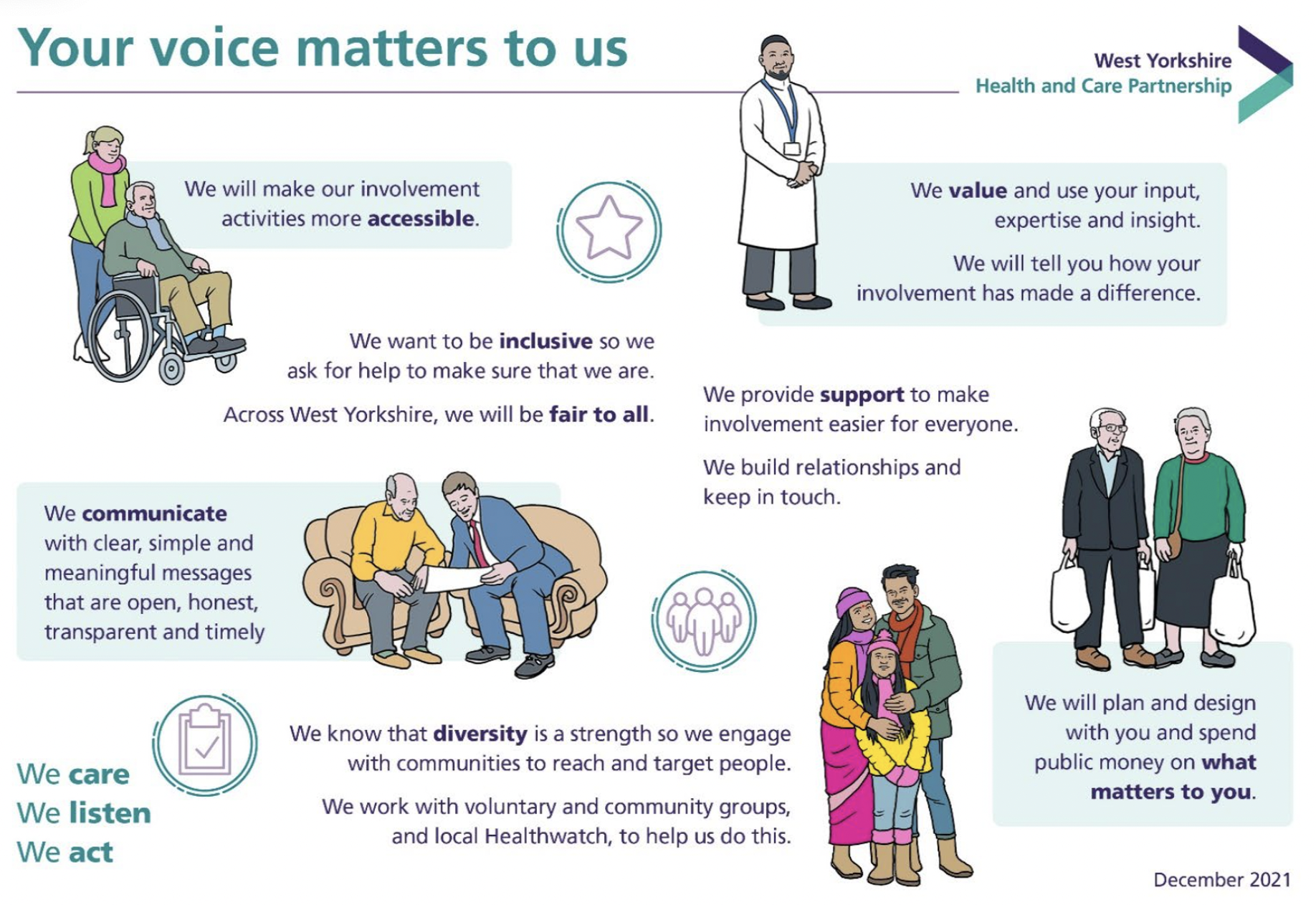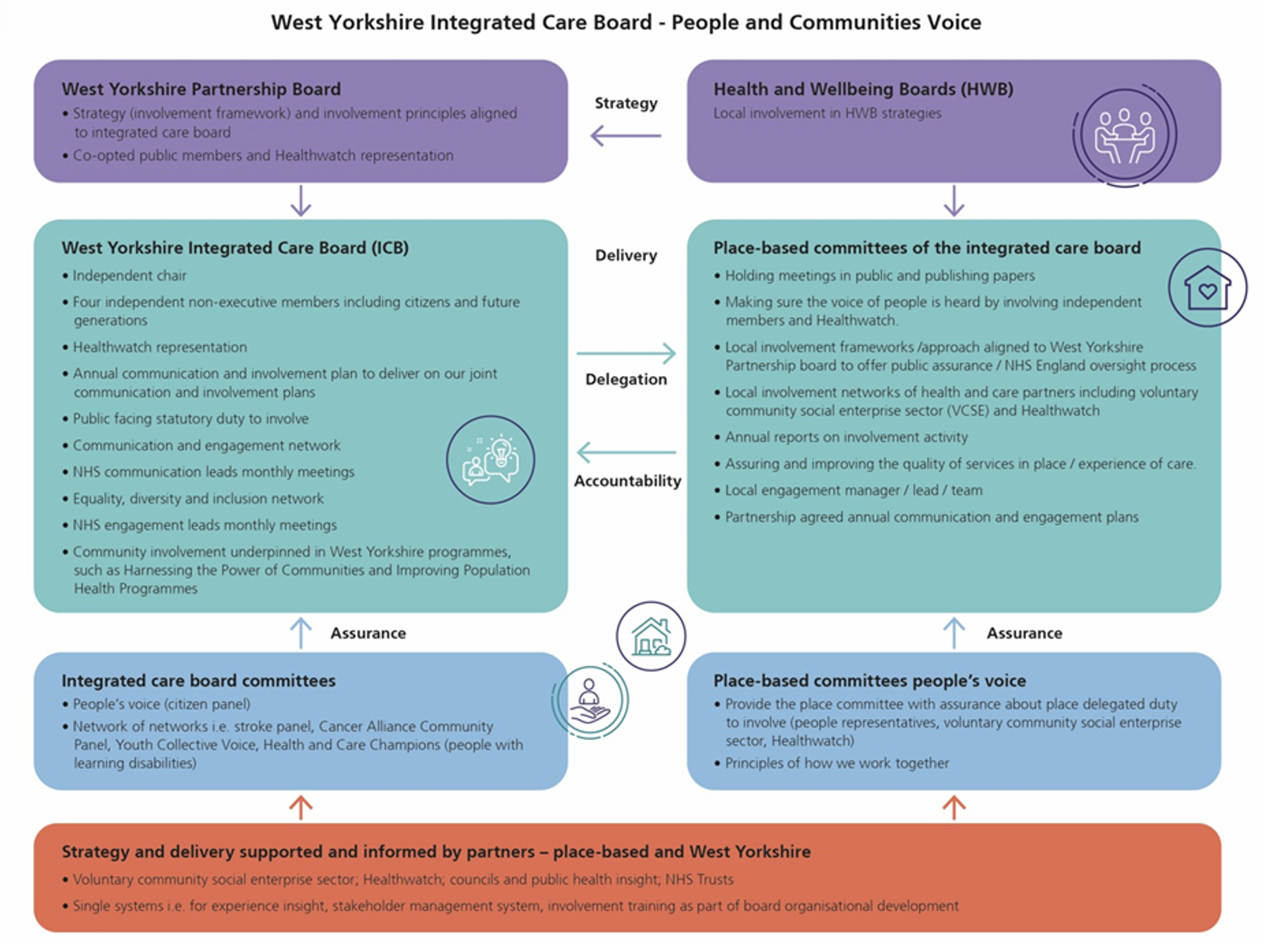Involving partners, people and patients in integrated care: a case study from West Yorkshire Health and Care Partnership
23 May 2023
One of the many considerations facing system leaders as integrated care systems continue to develop is how they build appropriate engagement and involvement of partners, patients and the populations they serve into decision-making.
In July 2022 NHS England issued new statutory guidance - working in partnership with people and communities - for integrated care boards, NHS trusts and foundation trusts and policy for NHS England. The guidance sets out:
- expectations around meeting public involvement legal duties and the new ‘triple aim’ of better health and wellbeing, improved quality of services and the sustainable use of resources
- how working with people and communities supports the wider objectives of integration including population health management, personalisation of care and support, addressing health inequalities and improving quality – it supports organisations to build collaborative and meaningful partnerships that start with people and focus on what really matters to our communities.
There are clear advantages in involving people in the structures that govern the services they use and in the decisions that impact them, not just in terms of legitimacy and credibility and the expertise they bring but also to help ICSs to address inequalities by really understanding communities’ needs and developing solutions with them.
West Yorkshire Health and Care Partnership have done a lot of good work setting up the governance structures for their system mindful of involving partners, people and patients that we think provides useful learning for other systems.
Karen Coleman, Associate Director for Communications and Engagement, West Yorkshire Health and Care Partnership.
Since our partnership began in 2016, we have been passionate about ensuring that our approach meets the needs of people living, working, caring, and volunteering in West Yorkshire. This includes making sure that people remain at the centre of our planning and decision-making, and that we listen to and talk with people delivering care, people and their families and carers accessing care, and local communities. We are also accountable to people living in West Yorkshire for their NHS services.
For the past seven years we have produced annual documents to support our approach, including:
- West Yorkshire Health and Care Partnership Programme Involvement Timelines for the year (and in plain text)
- West Yorkshire Health and Care Partnership Involvement and Consultation Mapping (insight work that has taken place over the past year).
- In April 2023 we updated our involvement timeline setting out our plans to involve people in our West Yorkshire priority programmes of work.
Our integrated care board people voice info graphic, which is part of the involvement framework, (download the presentation with audio here) sets out a governance structure for our integrated care board work. All should be read alongside the West Yorkshire Health and Care Partnership Communications and Involvement Plan, which is updated annually with priorities, and challenges.

Our framework outlines the approach we take to help tackle the health inequalities we know exist in West Yorkshire. This activity takes place in our five local places (Bradford District and Craven, Calderdale, Kirklees, Leeds and Wakefield District), with the skill and expertise of local colleagues.
You can see wonderful examples in the work of the Wakefield Big Conversation, which is all about understanding what it is like to live, work and grow in the district, and The Big Leeds Chat, a city-wide conversation about what matters to local people including health and wellbeing.
Other examples include the Bradford District and Craven Listen in sessions, Calderdale’s Engagement Champions and Kirklees Community Voices who help support conversations about health care services with residents and communities, particularly among seldom heard groups.
Partnership programmes also strive to include lived experience in our decision-making, such as people with learning disabilities, The Cancer Community Panel and the work of the Partnership’s Youth Collective Voice, to name a few.
Our starting point is building on what we already know. In 2021 we commissioned an independent involvement review. Over 100 colleagues, including those from local authorities, NHS, voluntary, community and social enterprise sector, Healthwatch and patient, public and carer representatives, were involved. We are implementing the recommendations, which includes involvement training and having a West Yorkshire People Panel called the West Yorkshire Voice, which will be a network made up of people, communities, organisations, local panels, and groups from across the area. This is coordinated by Healthwatch.
We have good work to build on and much to do. This includes getting better at gathering insight across the whole of West Yorkshire, which in turn will help us better understand people’s needs and plan our work.
This is all well and good, but what really matters to us is that we are making a positive difference to peoples’ lives, that we assure communities we are listening, we collaborate with communities to deliver services, and above all we are held accountable. To help support this, we implemented a schedule of informal private engagement sessions with people with lived experience before the ICB meetings held in public to ensure their experiences and views were heard, ahead of decision-making. Listening is captured, and actions are fed back to those who participate, with outcomes and outputs shared via our governance work. Board members regularly engage with colleagues and communities outside of the board, by visiting hospitals, community partners and youth forums.

The Good Governance Institute worked with us in 2022 to assess and improve our governance arrangements for integrated care board involvement. A review of the documents, alongside a workshop with engagement and governance colleagues, gave us the opportunity to discuss learning and good practice. We have already made progress and are working on further improvements, including ensuring even private conversations are captured with clear outcomes identified.
We have continued to be honest, open, and transparent in our work, so that people can have their say and are able to shape and improve access to services and care delivery, locally and a West Yorkshire level. We are proud of the approach we collectively take, and our meetings held in public, communication plans, weekly bulletins, social media, leadership messages and our website aim to reflect that we are listening.
Getting involvement right is crucial to good governance. The key challenge for systems is doing this in a way that is appropriate and proportionate and gets the best of the involvement and makes it meaningful. West Yorkshire Health and Care Partnership is a good reference point. If you’d like to find out more about the work, it has done please contact Karen Colman.
If you’d like to hear more about the support GGI can provide, let’s have a conversation.
